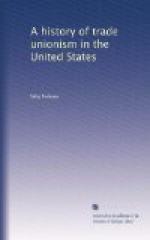During 1902 the essential instability of the arrangement led to sharp friction. The miners claimed that many operators violated the unwritten agreement. The operators, on their part, charged that the union was using every means for practically enforcing the closed shop, which was not granted in the understanding. In the early months of 1902 the miners presented demands for a reduction of the hours of labor from 10 to 9, for a twenty percent increase in wages, for payment according to the weight of coal mined, and for the recognition of the union. The operators refused to negotiate, and on May 9 the famous anthracite strike of 1902 began.
It is unnecessary to detail the events of the anthracite strike. No other strike is better known and remembered. More than 150,000 miners stood out for approximately five months. The strike was financed by a levy of one dollar per week upon all employed miners in the country, which yielded over $2,000,000. In addition several hundred thousand dollars came in from other trade unions and from the public generally. In October, when the country was facing a most serious coal famine, President Roosevelt took a hand. He called in the presidents of the anthracite railroads and the leading union officials for a conference in the White House and urged arbitration. At first he met with rebuff from the operators, but shortly afterward, with the aid of friendly pressure from New York financiers, the operators consented to accept the award of a commission to be appointed by himself. This was the well-known Anthracite Coal Strike Commission. Its appointment terminated the strike. Not until more than a half year later, however, was the award of the Commission made. It conceded the miners a 10 percent increase in wages, the eight and nine-hour day, and the privilege of having a union check-weighman at the scale where the coal sent up in cars by the miners is weighed. Recognition was not accorded the union, except that it was required to bear one-half of the expense connected with the maintenance of a joint arbitration board created by the Commission. When this award was announced there was much dissatisfaction with it among the miners. President Mitchell, however, put forth every effort to have the union accept the award. Upon a referendum vote the miners accepted his view.
The anthracite coal strike of 1902 was doubtless the most important single event in the history of American trade unionism until that time and has since scarcely been surpassed. To be sure, events like the great railway strike of 1877 and the Chicago Anarchist bomb and trial in 1886-1887 had equally forced the labor question into public attention. What distinguished the anthracite coal strike, however, was that for the first time a labor organization tied up for months a strategic industry and caused wide suffering and discomfort to the public without being condemned as a revolutionary menace to the existing social order




